- Home
- Michael Cunningham
Hours Page 14
Hours Read online
Page 14
She turns and walks away. It seems possible, at this moment, that there is somewhere else — a place having to do neither with boiled beef nor with the circle of roses. She passes through the garden gate and into the passageway, heads toward town.
As she crosses Princes Street and goes down Waterloo Place (toward what?) she passes others: a plump, stately man with a satchel, two women who must be servants returning from an afternoon off, chattering, white legs flashing from under thin coats, the cheap glint of a bracelet. Virginia gathers the collar of her cloak around her neck, though it isn't cold. It is merely darkening, with a wind. She believes she will walk into town, yes, but what will she do there? The shops, even now, are being swept and readied for closing. She passes a couple, a man and woman younger than herself, walking together, leisurely, bent toward each other in the soft lemon-colored glow of a streetlamp, talking (she hears the man say, "told me something something something in this establishment, something something, harrumph, indeed"); both man and woman wearing stylish hats, the fringed end of a mustard scarf (whose?) rippling behind like a flag; both of the m bent slightly forward as well as toward each other, mounting the hill, holding their hats against the wind, avid but unhurried, coming home (most likely) from a day in London, he saying now, "And so I must ask you," after which he lowers his voice—Virginia can't make out the words at all—and the woman emits a gleeful little shriek, showing a quick white flash of tooth, and the man laughs, striding forward, setting down with perfect confidence the toe of one and then another perfectly polished brown shoe.
I am alone, Virginia thinks, as the man and woman continue up the hill and she continues down. She is, of course, not alone, not in a way anyone else would recognize, and yet at this moment, walking through wind toward the lights of the Quadrant, she can feel the nearness of the old devil (what else to call it?), and she knows she will be utterly alone if and when the devil chooses to appear again. The devil is a headache; the devil is a voice inside a wall; the devil is a fin breaking through dark waves. The devil is the brief, twittering nothing that was a thrush's life. The devil sucks all the beauty from the world, all the hope, and what remains when the devil has finished is a realm of the living dead—-joyless, suffocating. Virginia feels, right now, a certain tragic grandeur, for the devil is many things but he is not petty, not sentimental; he seethes with a lethal, intolerable truth. Right now, walking, free of her headache, free of the voices, she can face the devil, but she must keep walking, she must not turn back.
When she reaches the Quadrant (the butcher and greengrocer have already rolled up their awnings) she turns toward the rail station. She will go, she thinks, to London; she will simply go to London, like Nelly on her errand, although Virginia's errand will be the trip itself, the half hour on the train, the disembarking at Paddington, the possibility of walking down a street into another street, and another after that. What a lark! What a plunge! It seems that she can survive, she can prosper, if she has London around her; if she disappears for awhile into the enormity of it, brash and brazen now under a sky empty of threat, all the uncurtained windows (here a woman's grave profile, there the crown of a carved chair), the traffic, men and women going lightly by in evening clothes; the smells of wax and gasoline, of perfume, as someone, somewhere (on one of these broad avenues, in one of these white, porticoed houses), plays a piano; as horns bleat and dogs bay, as the whole raucous carnival turns and turns, blazing, shimmering; as Big Ben strikes the hours, which fall in leaden circles over the partygoers and the omnibuses, over stone Queen Victoria seated before the Palace on her shelves of geraniums, over the parks that he sunken in their shadowed solemnity behind black iron fences.
Virginia descends the stairs to the rail station. The Richmond station is at once a portal and a destination. It is columned, canopied, full of a faint burnt smell, slightly desolate even when crowded (as it is now), lined with yellow wooden benches that do not encourage lingering. She checks the clock, sees that a train has just pulled away and the next will not leave for almost twenty-five minutes. She stiffens. She had imagined (foolish!) stepping straight onto a train or, at most, waiting five or ten minutes. She stands impatiently before the clock, then walks a few slow paces down the platform. If she does this, if she gets on the train that leaves in, what now, twenty-three minutes, and goes to London, and walks in London, and catches the last train back (that will get her home to Richmond at ten minutes past eleven), Leonard will be insane with worry. If she calls him (there is a public telephone, recently installed, here at the station) he'll be furious, he'll demand that she return immediately; he'll suggest (he would never say it outright) that if she becomes exhausted and overwhelmed, if she falls ill again, she will have brought it on herself. And here, of course, is the dilemma: he's entirely right and horribly wrong at the same time. She is better, she is safer, if she rests in Richmond; if she does not speak too much, write too much, feel too much; if she does not travel impetuously to London and walk through its streets; and yet she is dying this way, she is gently dying on a bed of roses. Better, really, to face the fin in the water than to live in hiding, as if the war were still on (strange, how the first memory that springs to mind, after all that, is the endless waiting in the cellar, the whole household crammed in together, and having to make conversation for hours with Nelly and Lottie). Her life (already past forty!) is being measured away, cupful by cupful, and the carnival wagon that bears Vanessa—the whole gaudy party of her, that vast life, the children and paints and lovers, the brilliantly cluttered house—has passed on into the night, leaving its echo of cymbals behind, its accordion notes, as wheels roll off down the road. No, she will not telephone from the station, she will do it once she's reached London, once there's nothing to be done. She will take her punishment.
She buys a ticket from the red-faced man behind the grille. She goes and sits, very erect, on a wooden bench. Eighteen minutes still. She sits on the bench, staring straight ahead (if only she had something to read) until she can't bear it any longer (fifteen minutes still). She stands and walks back out of the station. If she strolls one block along Kew Road, and strolls back, she will be just in time for her train.
She is passing her fragmented golden reflection in the gold name of the butcher shop, suspended on the glass over a lamb's carcass (a tuft of pale wool still clings to its ankle bone), when she sees Leonard walking toward her. She thinks, for a moment, that she will turn and run back to the station; she thinks she will escape some sort of catastrophe. She does not do any such thing. She continues walking forward, toward Leonard, who has clearly come out in a hurry, still wearing his leather slippers, and who looks exceedingly thin — gaunt — in his vest and corduroy jacket, his open collar. Although he has come after her like a constable or proctor, a figure of remonstrance, she is impressed by how small he seems, in slippers on Kew Road; how middle-aged and ordinary. She sees him, briefly, as a stranger might see him: merely another of the many men who walk on streets. She is sad for him, and strangely moved. She manages an ironic smile.
"Mr. Woolf," she says. "What an unexpected pleasure."
He says, "Would you like to tell me what you're doing, please?"
"I'm taking a walk. Does it seem mysterious?"
"Only when you vanish from the house, just before dinner, without a word."
"I didn't like to interrupt you. I knew you were working."
"I was."
"Well, then."
"You mustn't disappear. I don't like it."
"Leonard , you're acting very peculiar."
He scowls. "Am I? I don't know what it is, really. I went to look for you, and you weren't there. I thought, something's happened. I don't know why."
She imagines him searching the house for her, checking the garden. She thinks of him rushing out, past the body of the thrush, through the gate, down the hill. She is suddenly, immensely sorry for him. She should, she knows, tell him that his premonition was not entirely wrong; that she had in fact staged an escape of sorts, and had i
n fact meant to disappear, if only for a few hours.
"Nothing's happened," she says. "Just an airing along the avenues. It's such a night. "
"I was so worried," he says. "I don't know why."
They stand together in a brief, unaccustomed silence. They look into the window of the butcher's shop, where they are reflected, brokenly, in the golden letters.
Leonard says, "We must go back for Nelly's joint. We have approximately fifteen minutes before she goes on a rampage and burns the house down."
Virginia hesitates. But London! She still wants, desperately, to get on the train.
"You must be hungry," she says.
"I am, a bit. You surely are, too."
She thinks suddenly of how frail men are; how full of terror. She thinks of Quentin, going into the house to wash the thrush's death off his hands. It seems, at that moment, that she straddles an invisible line, one foot on this side, the other on that. On this side is stern, worried Leonard, the row of closed shops, the dark rise that leads back to Hogarth House, where Nelly waits impatiently, almost gleefully, for her chance at further grievances. On the other side is the train. On the other side is London, and all London implies about freedom, about kisses, about the possibilities of art and the sly dark glitter of madness. Mrs. Dalloway, she thinks, is a house on a hill where a party is about to begin; death is the city below, which Mrs. Dalloway loves and fears and which she wants, in some way, to walk into so deeply she will never find her way back again.
Virginia says, "It's time for us to move back to London. Don't you think? "
"I'm not at all sure," he answers.
"I've been better for a long while now. We can't haunt the suburbs forever, can we?"
"Let's discuss it over dinner, shall we?"
"All right, then."
"Do you want so much to live in London?" he asks.
"I do," she says. "I wish it were otherwise. I wish I were happy with the quiet life."
"As do I."
"Come along," she says.
She keeps the ticket in her bag. She will never mention to Leonard that she'd planned on fleeing, even for a few hours. As if he were the one in need of care and comfort—as if he were the one in danger—Virginia links her arm in his, and gives his elbow an affectionate squeeze. They start up the hill to Hogarth House, arm in arm, like any middle-aged couple going home.
Mrs. Dalloway
More coffee?" Oliver says to Sally.
"Thanks." Sally hands her coffee cup to Oliver's assistant, a surprisingly plain young man, white-blond, hollow-cheeked, who, although presented as an assistant, seems to be in charge of pouring coffee. Sally had expected an impeccable young stud, all jaw and biceps. This weedy, eager boy would look right at home behind the perfume counter in a department store.
"So what do you think?" Oliver says.
Sally watches her coffee being poured, to avoid looking at Oliver. When the cup has been set in front of her she glances at Walter Hardy, who betrays nothing. Walter has a talent, remarkable in its way, for looking utterly attentive and entirely blank, like a lizard that has crawled onto a sunny rock.
"Interesting," Sally says.
"Yes," Oliver answers.
Sally nods judiciously, sips her coffee. "I wonder," she says, "if it could actually get made."
"I think it's time," Oliver answers. "I think people are ready. "
"Do you, really?"
Sally appeals, silently, to Walter. Speak, you moron. Walter simply nods, blinking, basking, alert to the possibility of danger and, at the same time, all but hypnotized by the heat that emanates from Oliver St. Ives, who is trim and rumpled, forty five-ish, keen-eyed behind his modest gold-rimmed glasses; whose image on celluloid has survived countless attempts by other men to murder him, swindle him, blacken his name, ruin his family; who has made love to goddesses, always with the same abashed ardor, as if he can't believe his luck.
"Yes," Oliver says, with an audible rise of impatience in his voice.
"It sounds really, well, interesting," Sally says, and can't help laughing.
"Walter could do it," Oliver says. "Walter could pull it off. Definitely."
At the sound of his name Walter rouses, blinks more rapidly, shifts forward in his chair, all but changes color. "I'd love to take a crack at it," he says.
Oliver smiles his famous smile. Sally is still surprised, sometimes, at how much Oliver resembles himself. Aren't movie stars supposed to be short, ordinary, and ill-tempered? Don't they owe us that? Oliver St. Ives must have been identifiable as a movie star since childhood. He is incandescent; he is Bunyanesque. He can't be much under six foot four, and his perfectly formed, blond-tufted hands could easily palm most other men's heads. He is large-featured, flat-faced, and if in person he is not quite so handsome as he is on screen he carries every bit as much of that mysterious and undeniable singularity, a singularity not just of spirit but of the flesh as well, as if all other brawny, exuberant, unflinching American men were somehow copies of him, either well or indifferently made.
"Do," Oliver says to Walter. "I have great faith in your powers. Hey, you wrecked my career with one little story. "
Walter tries a knowing grin but it comes out hideously debased, and full of hatred. Sally imagines him, suddenly and with perfect clarity, at the age of ten. He would have been overweight, desperately friendly, able to calibrate the social standing of other ten-year-olds to the millimeter. He would have been capable of treachery in almost any form.
"Don't give me that," Walter says, grinning. "Didn't I try to talk you out of it? How many times did I call?"
"Oh, don't worry, little friend, I'm pulling your leg," Oliver says. "I don't regret anything, not one thing. What do you think about the screenplay?"
"I've never tried a thriller before," Walter says.
"It's easy. It's the easiest thing in the world. Rent a half dozen of the ones that made money, you'll know all you need to know."
"This one would be a little different, though," Sally says.
"No," Oliver answers with smiling, peevish patience. "No different. This one would have a gay man for a hero. That's the only thing, and it's not that big a deal. He wouldn't be tortured about his sexuality. He wouldn't have HIV. He'd just be a gay guy who does his job. Who saves the world, one way or another."
"Mm-hm," Walter says. "I think I could do that. I'd like to try.
"Good. Excellent."
Sally sips her coffee, wanting to be gone, wanting to stay; wanting not to want to be admired by Oliver St. Ives. There is no more powerful force in the world, she thinks, than fame. To help maintain her equilibrium she looks around the apartment, which appeared on the cover of Architectural Digest a year before Oliver revealed himself and will probably not appear in a magazine ever again, given what Oliver's announced sexual nature now implies about his taste. The irony, Sally thinks, is that the apartment is hideous in a way she associates with macho flamboyance, with its Lucite coffee table and brown lacquered walls, its niches in which spotlit Asian and African objects (Oliver surely thinks of them as "dramatically lit") suggest, despite their immaculate and reverential display, not so much connoisseurship as plunder. This is the third time Sally has been here, and each time she's felt the urge to confiscate the treasures and return them to their rightful owners. She feigns attention to Oliver while imagining herself entering a remote mountain village amid cheers and ululations, carrying the age-blackened antelope mask or the pale green, faintly phosphorescent porcelain bowl in which two painted carp have swum for ten centuries.
"You're not so sure, Sal?" Oliver says.
"Hm?"
"You're not convinced."
"Oh, well, convinced, not convinced, I'm way out of my depth here. What do I know about Hollywood?"
"You're smarter than most of those characters out there. You're one of the only people connected with the business who I respect."
"I'm not 'connected with the business,' not at all, you know what I do — "
"Well, no, I'm not," she says. "But really, who cares?"
Oliver sighs and pushes his glasses higher up on his nose, a gesture Sally is certain she remembers from one of the movies, something involving a mild-mannered (accountant? attorney? could it have been a TV producer?) who is finally driven to brutally extinguish a small army of drug dealers to save his teenage daughter.
"I admit we'd have to do it just right," Oliver says slowly. "I don't have any illusions about it being a sure thing."
"Would he have a lover? "
" A companion. A sidekick. Sort of like Batman and Robin."
"Would they have sex?"
"Nobody has sex in a thriller. It slows the action down too much. You lose the kids. At most, there's a kiss at the end."
"Would they kiss at the end, then?"
"That's Walter's department."
"Walter?"
Walter blinks back into action. "Hey," he says, "I just three minutes ago said I think maybe I could do it. Don't get too fancy on me, huh?"

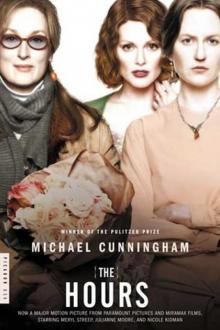 The Hours
The Hours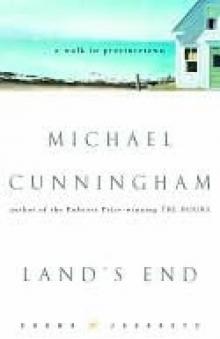 Land's End: A Walk in Provincetown
Land's End: A Walk in Provincetown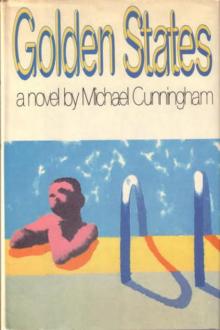 Golden States
Golden States A Wild Swan
A Wild Swan A Home at the End of the World
A Home at the End of the World Flesh and Blood
Flesh and Blood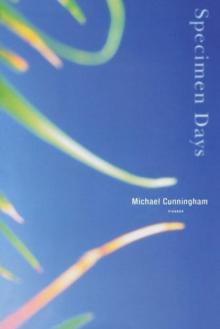 Specimen Days
Specimen Days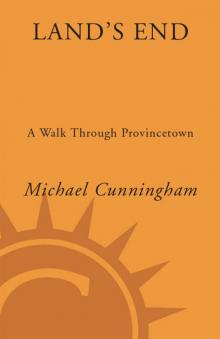 Land's End
Land's End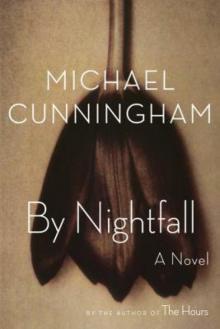 By Nightfall
By Nightfall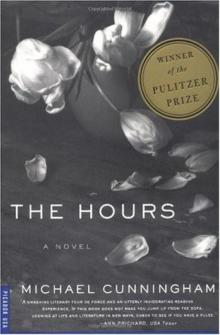 Hours
Hours